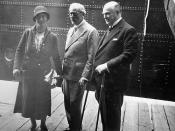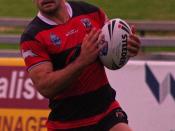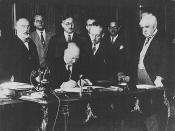William J. Bennett, a great spokesman for American conservatives, has powerfully argued as the title indicates in his article "Against Gay Marriage." One does not have to agree with Bennett to appreciate the strength and goodness of his mind. Still, although he raises serious objections to same-sex marriage, his argument overall reads more like an outline, lacking specifics and expert opinions, referring to only one organized, careful study, and committing a number of logical fallacies which muddy and weaken his argument.
For example, in his opening, Bennett makes a very strong assertion--if not an outright exaggeration-- when he says that recognizing same-sex marriage "would be the most radical step ever taken in the deconstruction of society's most important institution" (288). The reader may wonder if any studies or expert opinions exist to support Bennett's view. Of course, Bennett is respected for his personal opinions, but wasn't the question about improving?In the next paragraph, Bennett, wanting to squelch the movement toward redefinition of marriage, cites the rather outlandish example of two brothers: "On what principled grounds could the advocates of same-sex marriage oppose the marriage of two consenting brothers?" By citing two homosexual brothers, Bennett commits the "straw man" fallacy.
That is, he reasons from an exceptional case that defies logic and, once recognized, does little for his argument. Who else has ever seen such an extreme example? By the way, is this a real pair of brothers, or are they merely made up and cited for the sake of argument? I suspect the latter as the two brothers remain nameless--and place-less, as well.
It appears that one logical fallacy breeds another, as in the very next paragraph, Bennett commits what strikes me as a glaring over-generalization. Referring to the traditional view of marriage, he asserts, "Nor is this view...


